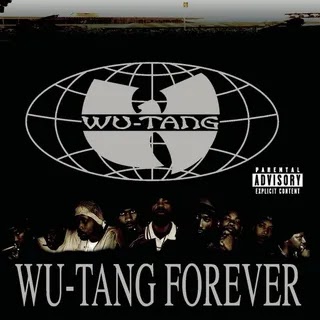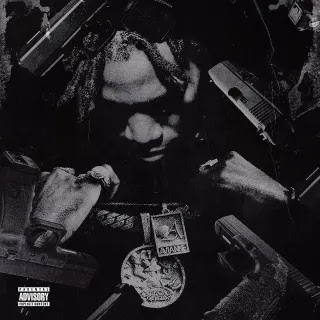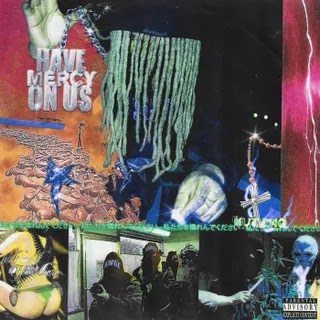Today on Pitchfork, we are celebrating the messy, game-changing, era-defining genius of the Wu-Tang Clan with five new reviews: two albums, two solo projects, and a film score.
In the summer of 1997, the Wu-Tang Clan were in the midst of their mafia movie montage—you know, when life is sweet and it seems like it’s always going to be that way. That summer, the nine Staten Island goons went on tour with one of the premier rock bands on Earth, Rage Against the Machine, blowing cash and sipping champagne on airplanes. They got a $960,000 budget for the special effects-ladened music video for “Triumph,” the famous, reckless, hookless posse cut. And at Giants Stadium in New Jersey, the Wu headlined Hot 97’s Summer Jam, when the station was still a king-maker. Yet instead of kissing the ring, the Wu flipped them off.
“Fuck Hot 97, we listen to Kiss FM!” is what Ghostface Killah yelled out to the crowd that night, annoyed at sound issues. He followed that uppercut with a haymaker, a flip on the station’s slogan—“Hot 97, where hip-hop dies!”— and eventually got the audience to chant along. Meanwhile, Method Man flung a battery at DJ Big Dennis Rivera and Funkmaster Flex backstage. For years after, the station shut the Wu out, refusing to spin their records as a group or solo. That would eventually hurt them, but at that moment, the Wu didn’t need the rap world—they had created their own.
The party records, big-money samples, and sleek R&B hooks of the Bad Boy shiny suit era were on the horizon, but in the years before the summer of ’97, the Wu went on a storybook run unlike any other group in rap history. From their instant classic 1993 debut Enter the Wu-Tang (36 Chambers) to a string of five solo albums between 1994 and 1996, a raucous crew of forgotten borough rap purists had become mega-stars.
By 1997, the world of the Wu was as deep and insular as professional wrestling. They fully established their own mythology and language: lingo remixed from Park Hill and Stapleton projects in Staten Island, an endless pool of aliases, nearly indecipherable inside references, and lyrics lined with allusions to kung fu flicks, Five-Percenter ideology, and ultra-specific New York City geography. That June, the group reunited for the 36 Chambers follow-up Wu-Tang Forever, with “Triumph” as the lead single. The sprawling, gloriously messy, double-disc album makes no concessions. It’s almost two hours of bars dunked in the Fresh Kills Landfill, dense wordplay, twisted humor that blurs the line between reality and fantasies told on the corner, and RZA’s unrelentingly dark production with a polished spin. Naturally they dethroned the Spice Girls for the No. 1 album in America, reaching the peak of their popularity as a collective.
On Forever, nobody can tell the Wu-Tang Clan shit. Part of the appeal is that they’re completely high on their own success. While 36 Chambers is a masterpiece—the raw energy of the raps is kinetic and RZA’s soul samples crackle like burning wood—it’s so air-tight that it doesn’t feel like the truest Wu-Tang experience. The Wu-Tang Clan are messy; if there’s a rule they’re going to break it, just because. Yes, Wu-Tang Forever is bloated and disjointed, but also the greatest distillation of the Wu at their most chaotic and functional. That it was made in such a contentious and uninspired environment is not completely unsurprising, given how goosed-up their egos were.
When Raekwon reflects on the writing of his 1995 mafioso rap epic Only Built 4 Cuban Linx he tells it like it was an Eat, Pray, Love-style excursion of self-discovery. Holed up for weeks in Barbados and then Miami with his spiritual confidant Ghostface, the pair wrote relentlessly, motivated by the warmth, ocean breeze, and a bond built over John Woo heroic bloodshed pictures and Wallabees.
The making of Wu-Tang Forever was far more clinical, as if they were clocking in after putting in their two weeks’ notice. A divide had grown between the members of the group who got the opportunity to release solo albums (Rae, Ghost, Dirty, Meth, and GZA) and those who didn’t (Deck, Masta Killa, and U-God). In an effort to reawaken their former camaraderie, RZA, the architect of their vision, brought everyone to L.A. to stay in separate rooms at one big apartment complex. That was no Barbados. A flame was not ignited; hardly anyone hung out with each other, most guys showed up hours late to sessions, and usually Ol’ Dirty Bastard disappeared altogether.
In the meantime, tensions flared over who was in control of the Wu brand, mostly directed at their manager and RZA’s older brother Divine. The more popular members felt the money was being divided up unfairly, and not everyone was psyched about the affiliate crews like Killarmy that RZA was stamping with the Wu logo. These frustrations boiled over in frequent arguments and a diminishing trust in RZA’s iron-clad grip on the sound.
Given the unrest, it’s a miracle that the rapping on Forever is so exciting. When they rap the brotherhood is alive, even if the friendships aren’t. It might be because of RZA’s magic on the backend, stitching together loose threads as only he can. It might be because pretty much everyone was a more skilled rapper than they were four years earlier. But I like to believe that it’s in tune with the Hong Kong action movies they worshiped. In those films sometimes blood and non-blood brothers engage in a sword duel or point handguns at each other’s faces, but when they finally team up, the connection is almost mystical.
Though the album has the runtime of a movie, it’s the brief moments that reestablish their one-of-a-kind chemistry. On “Deadly Melody,” when GZA so smoothly interrupts Masta Killa and U-God for two lines of his evocative imagery: “Fifty caliber street sweeper/Shots from Shaolin that go to Massapequa.” How Method Man floats in the background of Raekwon’s intensely delivered street politics on “Cash Still Rules/Scary Hours,” before brightening the mood with his smooth singsongy gibberish. How tonally connected Dirty and honorary tenth member Cappadonna are on “Maria”: Dirty howls wistfully about this fine woman who gave him gonorrhea and Capp reveals he has the pick-up game of Michael Cera in Superbad. It’s ridiculous as hell.
“Maria” goes off the rails because of a RZA verse tacked on at the end, where he sounds bitter about being dumped or something. RZA does that a lot. There is probably too much of him on Forever, a sign of how much control he had, but the way he raps every line as if it could change your life is magnetic, even when it’s not as deep as he thinks. He’s so engaging that even when he parts the seas so he can monologue for a couple of minutes, it’s mesmerizing. “Yo this is true hip-hop you listenin’ to right here/In the pure form, this ain’t no R&B with a wack nigga takin the loop,” he says on the intro to disc 2, so convincing that he probably could have made C. Delores Tucker believe in the magic of hip-hop for a split second.
On the production tip, RZA’s beats still have this grimy soul to them, but lag behind much of his other work during this peak period. Slowly he was moving away from samples and stripping back his sound, going for a more cinematic style; unsurprisingly, two years later he composed his first film score. He splits the difference comfortably on the first disc, his stronger side: the funk of “As High as Wu-Tang Get,” the slight distortion on the sample of “For Heavens Sake,” the forceful piano on “Severe Punishment” feels like it could soundtrack a chase scene in a Blaxploitation thriller. As for the second disc, the bloat of the more than a hour runtime is only an issue because the production isn’t urgent enough. There are lulls that ruin the groove, like the plodding sound of “Little Ghetto Boys” and 4th Disciple’s drab backdrop of “The City,” which is nowhere nearly as colorful as Inspectah Deck’s rhymes.
In the mid-1990s, there were two floods in RZA’s basement where it was said he lost more than 500 beats. But the most substantial loss was Inspectah Deck’s debut album. He would start again from scratch, and after some label nonsense, his redone debut eventually hit stands in 1999. It’s aight. But that lost album made during RZA’s creative apex has become mythical. Its status is only boosted by how his dazzling wordplay and buttery delivery stands out among larger personalities throughout Forever. “Yo, in the housing, thousands seen early graves/Victims of worldly ways, memories stays engraved,” Deck opens on “A Better Tomorrow.” His words are slick, but without sacrificing the scene setting that captures it all like a drone shot. Then there’s his star turn on “Triumph”: The song is kinetic throughout its nearly six-minute runtime despite contributions from the whole crew, and Deck’s thickly layered yet clear-eyed opening verses rises above the rest. It’s like watching Kyrie Irving dribble in slow motion.
“Triumph” closes with the one-two punch of Ghostface and Raekwon, who are on some shit on Forever. Coming off the combination of 1995’s Cuban Linx and 1996’s Ironman—Ghost was a couple years away from reaching rarified air with Supreme Clientele—it’s like they believe all of their words should be enshrined. I wouldn’t say that’s always true—Ghost’s sex chronicles on “The Projects” could have stayed in his journal and Rae nosedives his “Duck Seazon” verse with homophobia. But for the most part, their writing is full of so much imagination and detail that on posse cuts it’s hard to pay attention to the verses that come before or after them. Sorry to Masta Killa, but his solid mathematics-driven words are overshadowed by the mystifying Rae verse on “Visionz.” And Method Man’s voice owns “Cash Still Rules/Scary Hours,” but only until Ghostface struts in reminiscing about robberies with a glimmer in his eye like he’s talking about his Little League memories.
When Ghost and Rae have the Wu around the firepit telling stories that may or not be truth, Forever doesn’t get much better than that. There is “Impossible,” which is a heavy-hearted Ghost chronicle so vivid that it feels like the framework for a memoir. The mood is a lot lighter on Ghost and Rae’s concept track “The M.G.M.” about attending a boxing match between Julio César Chávez and Pernell “Sweet Pea” Whitaker. They finish each other’s lines, have a conversation about The Supreme Wisdom, and spot celebrities, all while moving the story along with lines that never stop the groove. It’s like they’re Statler and Waldorf, high on dust.
The big disappointment of Forever is Dirty. He’s funny on “Maria” and his intro to “Triumph” is iconic, but he’s largely an afterthought. This was around the time when his reliance on drugs and alcohol was getting worse, and his communication with the Wu suffered. He feels detached from the group, and his half-assed solo track, “Dog Shit,” has none of the natural charisma of his 1995 debut.
“Dog Shit” is the nadir of the second disc, which is overstuffed with solo tracks nobody ever asked for (Tekitha?!), sketches, and B-tier posse cuts, but it’s that excess that gives the album so much of its personality. On a more concise album, Ghost and Rae wouldn’t have gotten a chance to clear out for a couple of minutes of paranoid crime fiction. An editor may have told Deck to save his solo spotlight for his debut. A rational group would have told U-God to keep “Black Shampoo,” his borderline soft porno ode to massages with peppermint oil and fragrances in the drafts. But they probably didn’t even think twice about it. They were the Wu-Tang Clan and if they said it it was hot. That’s amazing; you couldn’t tell them shit.
Soon after, their invincibility wore off, and their slow plateauing was mostly self-inflicted. By the time they reunited for 2000’s The W, which still features lots of great rapping, the group was even more fractured as faith diminished in RZA’s ability as a producer. Meanwhile, the lack of financial transparency created a rift that would never be properly mended. When the 2010s came around, Raekwon was communicating with the group through representatives and RZA was bleeding the Wu brand dry with gimmicks like 2015’s Once Upon a Time in Shaolin: A stitched together full-length with pre-recorded Wu verses that were pressed onto one copy, put into a custom silver box, and auctioned for $2 million to infamous pharma dude Martin Shkreli.
But if it had all gone smoothly, that wouldn’t have been the Wu-Tang Clan. Humility be damned; keep that shit elsewhere! Forever is the Wu-Tang Clan spitting their asses off. They wholeheartedly believed they were the most important artists in the world; for a moment it was nearly true, and they did it without giving an inch to the music industry, no matter how powerful. RZA wasn’t lying. Wu-Tang Forever is hip-hop in its purest form, for real.
















0 comments:
Post a Comment